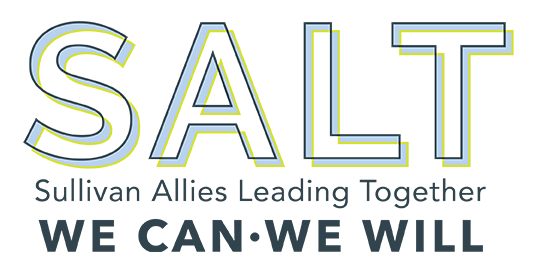Drug Free Communities Grant
The federally funded Drug Free Communities grant is awarded to community-based coalitions to strengthen the community’s infrastructure and create and sustain a reduction in youth substance use. SALT seeks to do this by employing our partners to educate the public while addressing subjects like perceptions of harm, social norms, and stigma.
SALT follows an evidence-based model, guided by the Community Anti-Drug Coalitions of America to affect both the risk and protective factors identified by data collected in our schools and our community at large. We seek to increase the perception of harm and knowledge of the dangers of underage non-medical marijuana and alcohol use by youth through regular visits to schools and the production and distribution of factual materials. By addressing stigma and listening with non-judgmental ears, we hope to enhance conversations that lead to good health and a stable community.
Along with education, our focus is to give youth an alternative to underage substance use by empowering youth through the increase of pro-social activities. Using creative arts, physical activity, and promoting healthy youth development, we hope to enhance protective factors by regularly monitoring and addressing risk factors in Sullivan County.
What
We are offering to support you and alleviate some of the pressures you and your kids face on a daily basis.
When
We serve year round: before, during, and after school.
Where
We welcome all of the residents of Sullivan County
Stigma
Stigma refers to a deeply ingrained and negative societal attitude, belief, or stereotype that is directed toward a particular group of people or individuals with certain characteristics, identities, conditions, or attributes. Stigma can lead to discrimination, prejudice, and the marginalization of those who are perceived as different from the societal norm. It often results in social, economic, and emotional harm to the stigmatized individuals or groups and can create barriers to their full participation and inclusion in society.
Stigma can manifest in various forms, such as mental health stigma, racial stigma, gender stigma, and stigma related to disabilities or medical conditions, among others. Efforts to combat stigma aim to reduce these negative attitudes and promote greater understanding, empathy, and acceptance of diverse individuals and groups.
Stigma can be a significant barrier to social inclusion, equal opportunities, and overall well-being for individuals and groups who experience it. Sullivan Allies Leading Together (SALT) fights stigma by supporting healthy human development for all, which in turn, builds the foundation for people to live empowered lives. We supports everyone in owning who they are.
Social Norms
Social norms are unwritten and informal rules or expectations within a society or a particular group that dictate how individuals are expected to behave in various social situations. These norms are a form of social regulation that guide and shape the behavior, attitudes, and interactions of people in a community, culture, or society. Social norms can cover a wide range of behaviors, including manners, etiquette, values, customs, and moral standards, and they vary across different cultures, communities, and contexts. Social norms often dictate what is considered “normal” or “acceptable” behavior in a given context, influencing individuals’ choices and actions.
In our 2022 survey of Sullivan County adults and youth, only 5% of adults surveyed felt as though young people disapproved of youth recreational cannabis use (not to be confused with prescribed medical use). When we surveyed youth on the subject, more than half disapproved of youth recreational cannabis use. This discrepancy between adults’ perception of young people’s disapproval of recreational cannabis use and the actual views of young people highlights the gap between perception and reality. Social norms are often based on collective perceptions and beliefs within a community, but these perceptions may not always align with the actual behaviors or attitudes of individuals within that community.
This proves the importance of conducting accurate and representative surveys to understand the true beliefs and attitudes of a specific population, especially when making decisions or developing programs that are influenced by social norms. It also emphasizes the need for open inter-generational dialogue to bridge the gap between perceived norms and actual behaviors or attitudes. This is crucial for developing effective strategies, policies, and programs that align with the realities of a given community, ultimately promoting healthier and more informed decision-making among its members.
Youth Outreach Materials
Through regular visits to schools, community surveys, and dialog with both the youth and their parents we can begin to address the concerns of the community. Outreach materials have been developed with these concerns in mind using a fact based approach to addressing youth substance use.
DFC News

Youth Impact Initiative
The photos below represent work that was researched, designed and implemented by SALT's Youth Impact Initiative. All members are under the age of 18 and we greatly appreciate the time and heartfelt efforts they put into these prevention opportunities.

WEED – Legal Does Not Equal Safe

A Day of Youth Empowerment
A Day of Youth Empowerment Learn How to Make Your Own Business Community, substance use prevention and activism.When: POSTPONED! Stay tuned for more info.Where: Cornell Cooperative ExtensionAges: All SC High Schoolers, No Experience NeededRegistration: Call 848 333...

What is Impact?
Impact. What is Impact? Oxford’s Dictionary defines the word as, “having a strong effect on someone or something.” Merriam-Webster says, “the force of impression of one thing on another: a significant or major effect.” I believe Impact is the act of making a change to...

History of Substance Use
History of Substance Use in our County
Contact Us
Need services? We can help you find the right resource. Get in touch!
Email: salt@saltcares.com





